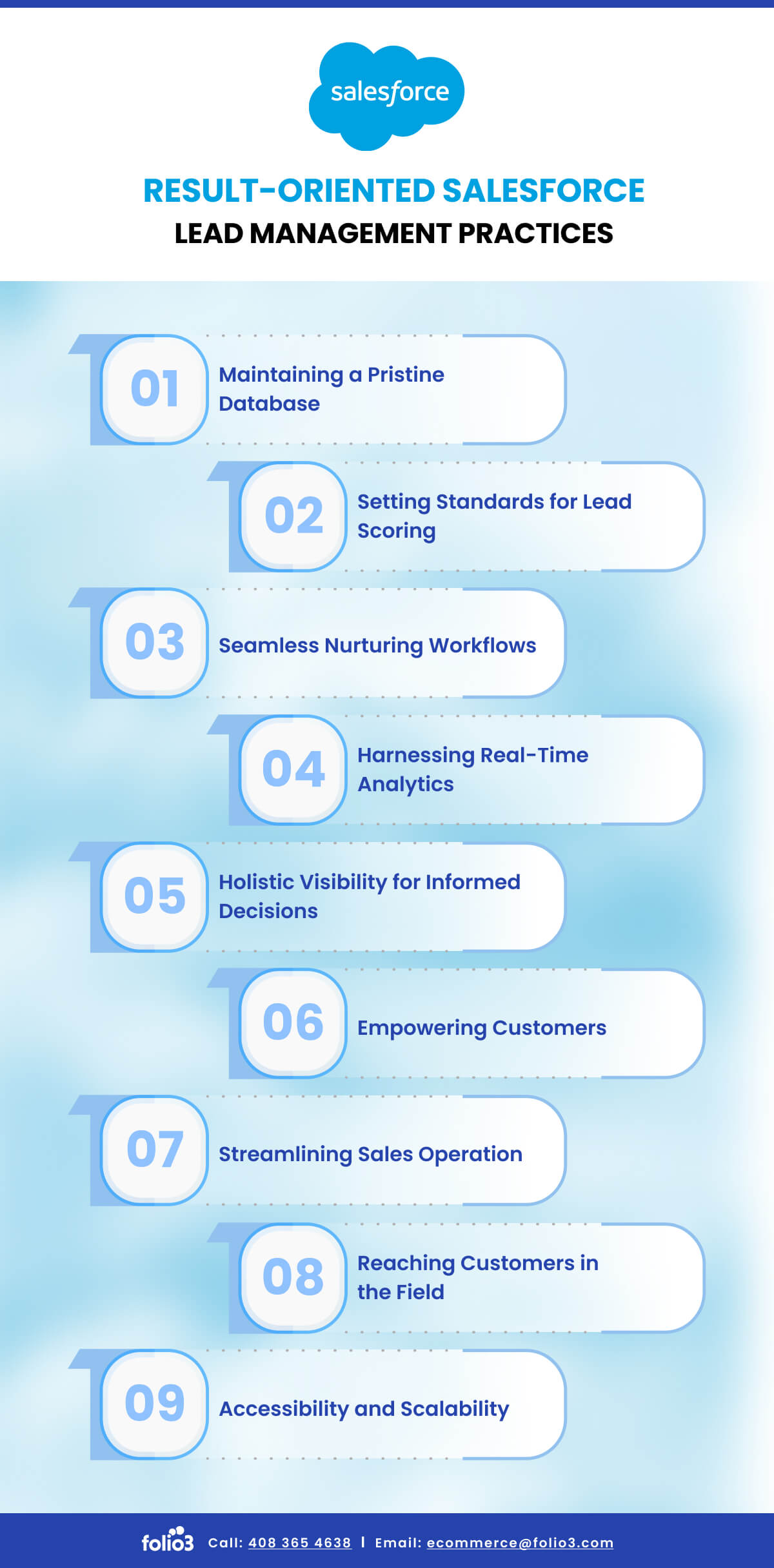Lead generation shapes your business fortune. The “shape” here refers to the technical implementation of lead generation, and for that, you need expert Salesforce lead management services.
Expert Salesforce implementation services in management are a key factor for achieving unparalleled wins in the competitive world of modern business. They are renowned for their customer relationship management (CRM) abilities, allowing organizations to perform dual duties like capturing leads and further nurturing them.
These duties are important for a healthy customer relationship, especially in a fast-moving world. Therefore, leveraging rising technology such as Salesforce to its fullest potential is a strategic imperative.
By hiring Salesforce experts, organizations can manage their sales without any hassle. But what seamless practices do they follow? How do the masters of leads get through a data-driven sales journey? Here are the best Salesforce implementation services you need to know about:
Result-Oriented Salesforce Lead Management Practices
Maintaining a Pristine Database
A pristine database is a foundation of success when it comes to Salesforce lead management. No matter how indebted the data is, if you cannot keep your data clean and ensure accurate information, eliminating errors and redundancies during the lead management process would be difficult.
Regular auditing and cleansing of the database can enhance the long-term efficiency in this case and cultivate trust in the system. Another major practice of Salesforce data migration includes implementing stringent data hygiene practices, such as deduplication and data validation. All that lays the foundation for a reliable and effective lead management process.
Read More: Guide to a Salesforce
Setting Standards for Lead Scoring
Lead scoring strategies are critical in Salesforce lead management but they should be smartly and effectively executed. By establishing clear and consistent standards for lead qualification, teams can prioritize their hard work on leads. This effort can be beneficial as that can generate the highest potential for conversion.
With this approach, Salesforce development services optimize resource allocation and improve the entire sales process. Fine-tuning lead scoring criteria based on historical data and continuous feedback ensures a dynamic and responsive qualification system that adapts to evolving market dynamics.
Seamless Nurturing Workflows
A successful Salesforce lead management process doesn’t end with lead qualification; in fact, it goes beyond it. Such as the smooth transitions into nurturing workflows. What is the point of earning leads when you cannot turn them into customers? This is where the establishment of well-defined and automated nurturing processes takes charge.
It makes sure that leads progress through the sales funnel efficiently. Personalized communication, targeted content, and continuous follow-ups contribute to building lasting relationships with prospects. By mapping out and optimizing these nurturing workflows, Salesforce 360 users can create a journey that simultaneously maximizes conversion rates and customer satisfaction.
Harnessing Real-Time Analytics
When it comes to useful lead management practices, real-time analytics can turn the table around. The way these analytics empower Salesforce users with actionable insights can be highly beneficial for data-driven decision-making.
Through analytics, organizations gain visibility into lead performance, campaign progress, and overall sales trends. This information allows for quick adjustments and strategic pivots to align with market dynamics. Integrating analytics tools within the Salesforce platform provides a perfect view of the lead management process, facilitating continuous improvement and informed decision-making.
Read More: What Is Salesforce Sales and Service Cloud?
Holistic Visibility for Informed Decisions
In Salesforce lead management, having a proper view of the entire picture is necessary. Without access to comprehensive visibility, stakeholders can struggle to understand the big picture. This involves the identification of bottlenecks, optimization of workflows, and execution of informed strategic decisions.
The same goes for using customizable dashboards and reporting features that Salesforce provides, as they provide a real-time shot of key performance indicators.
Read More: Questions to Ask Before Choosing Salesforce Consulting Services
Empowering Customers
It’s all about giving the customers the power of self-service. Here, self-service refers to the idea of helping customers with self-service capabilities. This powerful ability polishes their experience and simplifies the lead management process.
An easy accessibility to portals and self-service lets organizations allow leads to engage at their convenience. Apart from inducing customer satisfaction, this also frees up resources by reducing the need for manual interventions.
Streamlining Sales Operation
The structured workflows are the backbone of successful lead management in Salesforce. Streamlining the sales operations via automated processes or notifications ensures that the entire team operates cohesively.
Organizations can increase productivity and responsiveness by eliminating weak points and reducing manual interventions. Similarly, reviewing and optimizing workflows based on performance metrics and feedback ensures that the lead management process remains agile and adaptable to rising business needs.
Reaching Customers in the Field
In a dynamic business environment, reaching customers wherever they are is crucial for effective lead management. Salesforce’s mobile capabilities enable sales teams to access critical information and engage with leads while in the field.
This flexibility provided by Salesforce lead management best practices not only enhances responsiveness but also contributes to building stronger customer relationships. By extending Salesforce beyond the desktop, organizations can leverage the power of mobility to stay connected with leads and prospects in real-time, ultimately driving faster conversions and increasing overall efficiency.
Accessibility and Scalability
A business in this tech era can not prosper without harnessing the advantages of the cloud. That is why it has become the fundamental best practice in Salesforce Lead Management. The cloud provides accessibility to data and the Salesforce platform from anywhere.
Additionally, the scalability of cloud-based solutions assists organizations in adapting to changing business demands. The same goes for Salesforce for small businesses, too. So, embrace the cloud to incorporate high-level flexibility and collaboration in your lead management processes, as physical constraints do not bind them.
The cloud advantage is pivotal for staying agile, competitive, and future-ready in the ever-evolving landscape of lead management.
Take Away
As much as an adaptation of these Salesforce lead management practices results in an incredible lead generation journey, neglecting to master leads through Salesforce consulting services can result in significant setbacks. Inefficient lead handling may cause businesses to miss opportunities, lack personalized engagement, and ultimately lose potential customers.
Without a structured approach to lead management, organizations risk losing valuable insights into customer preferences and market trends. This can lead to misguided strategies, decreased sales efficiency, and a decline in staying competitive in the dynamic business landscape.
Hence, mastering leads through Salesforce lead management services is not just a feature; it’s a strategic advantage. It ensures that businesses not only capture leads but convert them into lasting relationships and sustain a resilient position in the ever-evolving market.
FAQs
What Is Salesforce Lead Management?
It is a process within the Salesforce platform that involves capturing, tracking, and managing potential customers or “leads” throughout their journey, from initial contact to conversion.
How Do I Organize Salesforce Leads?
Organize Salesforce leads by using lead status, assigning lead owners, and utilizing lead views and filters. Categorize leads based on their stage in the sales funnel, helping sales teams prioritize and manage their interactions effectively.
How Many Leads Can Be In Salesforce?
Salesforce lead management offers different editions with varying storage capacities. The number of leads in Salesforce depends on your subscription and storage limits. Check your Salesforce edition and storage allocation to determine the maximum number of leads you can have in your instance.

Hasan Mustafa
Engineering Manager Salesforce at Folio3
Hasan Mustafa delivers tailored Salesforce solutions to meet clients' specific requirements, overseeing the implementation of scenarios aligned with their needs. He leads a team of Salesforce Administrators and Developers, manages pre-sales activities, and spearheads an internal academy focused on educating and mentoring newcomers in understanding the Salesforce ecosystem and guiding them on their professional journey.
